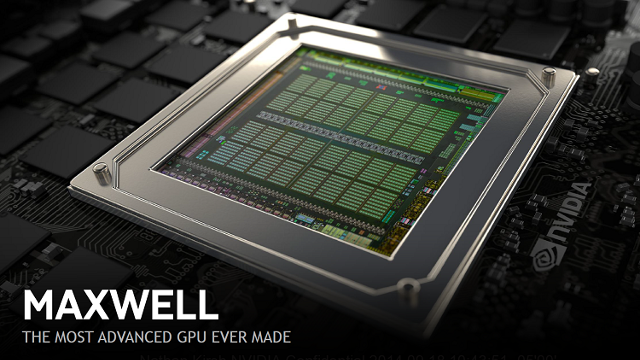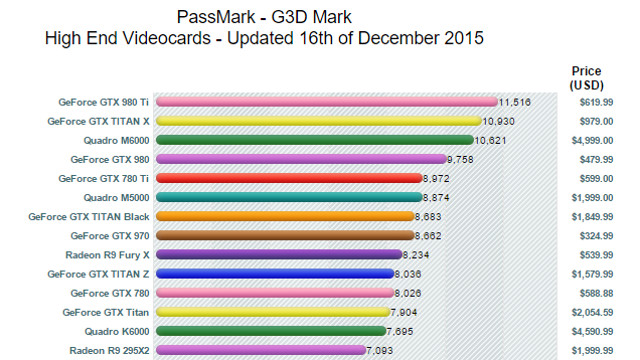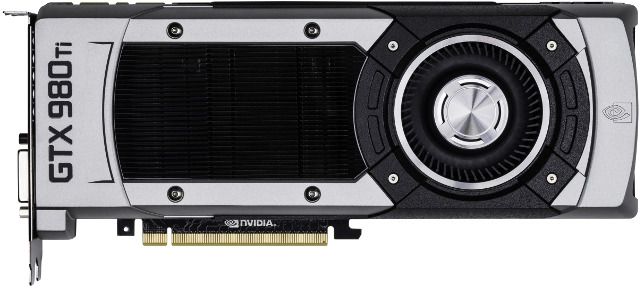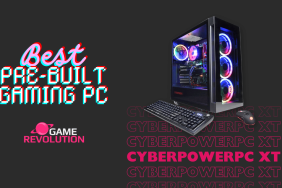Our game of the year awards will be coming up next week. While we'll be covering a whole lot of games, hardware won't be featured this time around. That said, I can't let Nvidia's latest beast go without recognition, so I want to take a moment to talk about the GeForce GTX 980 Ti.
When Nvidia launched its 900 series in late 2014, it quickly dominated performance and sales charts around the globe. Its Maxwell architecture was a step up in performance beyond anything the industry had seen in nearly a decade. Made better, it was equipped to handle several ambitious technologies including VXGI, DSR, and MFAA, along with the best software Nvidia has ever produced in GeForce Experience.
I happened to buy a GeForce GTX 970 close to launch, and hadn't been as impressed by a graphics card since the GeForce 8800 GTX debuted in 2006. During my one year ownership it has run every game I throw at it with high to ultra settings and a smooth 60 frames per second, all without becoming unbearably hot, producing a lot of noise, or drawing a ton of power. It's even survived my transition to a 1440p Dell Ultrasharp monitor, which has increased the number of pixels rendered by nearly 100% (1.6 million~ more per image).
A month after I purchased my GeForce GTX 970 friend of mine ended up investing in the GeForce GTX 980, which was one tier up. At just over $500 he was able to play games in ultrawide HD resolution, and without a hiccup. Ultimately, myself and him were like many other PC gamers: breathtakingly impressed by Maxwell.

At the time it seemed like it'd be a while before we'd see something nearly as impressive. Although the GeForce GTX Titan X came close when it debuted a few months later, its issues with heat and a 11.16~ price to performance ratio were noticeable caveats. It was certainly a remarkable specimen, and achieved G3D Mark scores of over 10,000, but it was a card unattainable by 99% of hardware enthusiasts.
It wasn't until a couple months later that rumor got out that a final Maxwell card would be released before the end of the year. Early leaks suggested that it would rival the GeForce GTX Titan X's chart-leading performance, which instantly captured the attention of the community. Although the rumors were exciting, nobody really knew just how impactful the card would be.
On June 2nd the GeForce GTX 980 Ti launched. It was equipped with 8000 transistors, 176 texture units, 96 ROPs, 2816 CUDA cores, a 384 bit bus, and clock speeds virtually identical to the GeForce GTX Titan X. The result was a card capable of processing power above 5 teraflops in single precision floating point. While it was reminiscent of Nvidia's top-tier card, where it shocked the world was with its price point; at $650~ MSRP, it was a 33% reduction in cost when compared to the GeForce GTX Titan X resulting in a jump of over 7 points in price to performance ratio.
The GeForce GTX 980 Ti has subsequently become one of the most dominant high-end cards in PC history. It is also by far the most affordable top-end card of the past five years, easily finding its way into sub-$1500 budgets.

Source: VideoCardBenchmark.net
It was so powerful, in-fact, that many considered that it somewhat invalidated the GeForce GTX 980 and GeForce GTX Titan X, both of which were cards that previously had prestigious reputations. While the GeForce GTX 980 still sells due to its slightly more modest price, and the GeForce GTX Titan X scores some sales for its 12GB of VRAM, their sales volume pales in comparison to Nvidia's latest addition to the line-up.
While we currently live in a 1080p dominated world, in the future 4K will be the standard resolution, especially following this Black Friday's sell-through of millions of 4K capable displays. Most cards simply don't have the processing power required to render modern games at this resolution, let alone meet the similarly high demands for virtual reality headsets.
The GeForce GTX 980 Ti is one of those pieces of hardware that not only sets a new bar for achievable performance, but raises the ceiling of potential for game developers. For that, it deserves recognition as one of this year's greatest technological triumphs.







